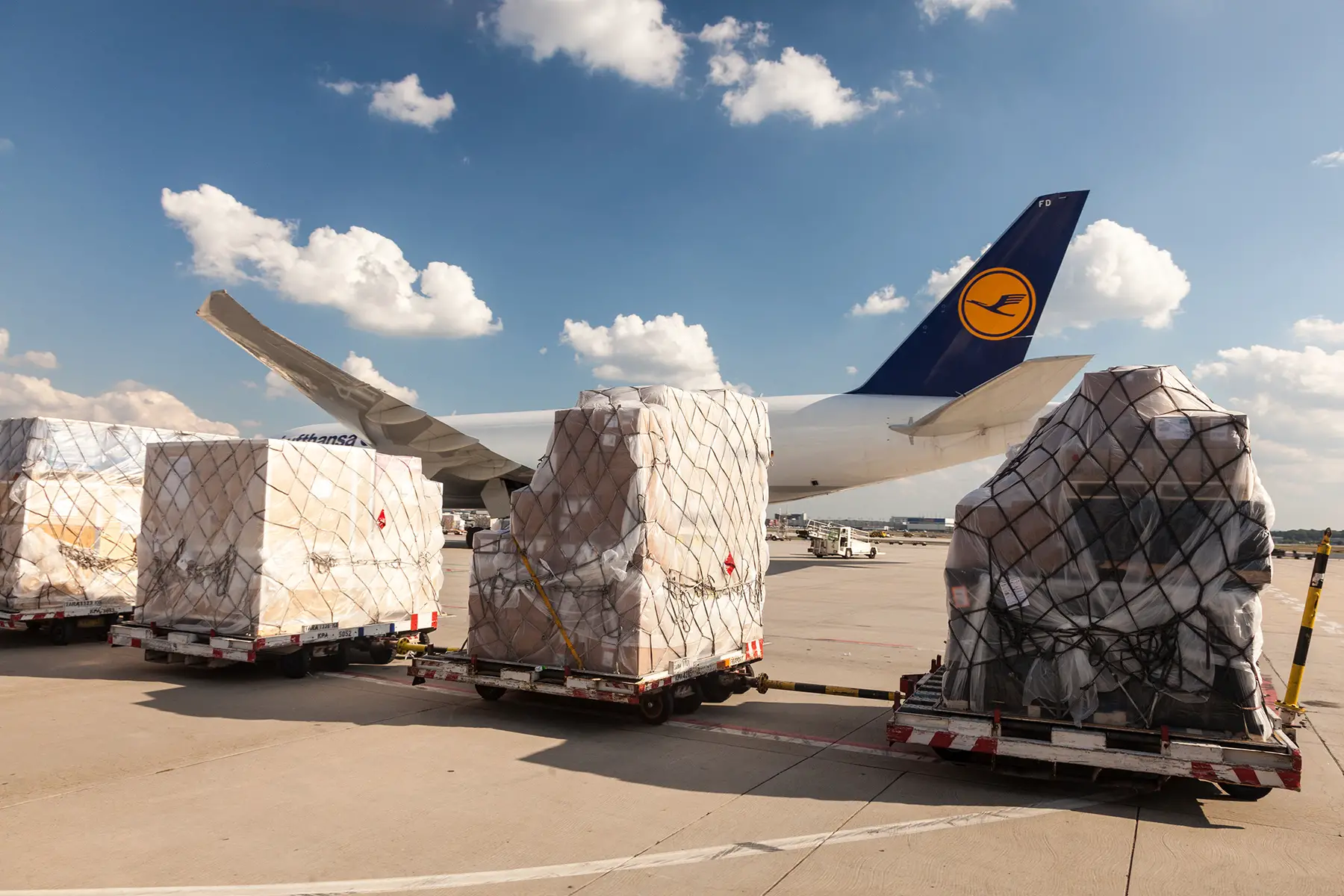Ready for your new life in Germany? Moving abroad is exciting, but relocating your belongings to a new country can seem confusing. Indeed, there’s a varied range of transport options available and a crowded marketplace of international relocation companies to choose from.
Wherever you’re moving to Germany from, there are many ways to ensure your belongings arrive safely and promptly. There are, however, many factors to consider before choosing an international moving option. This includes keeping to your budget, minimizing damage and breakages, and receiving your belongings in a respectable time period.
To help you decide which international moving option is best for your relocation to Germany, this guide explains the following parts of the process:
The Relocator
Planning a new life in Germany? Give yourself some peace of mind with The Relocator. On their easy-to-use platform, you'll be able to compare your options quickly, getting quotes from some of the biggest names in global relocations. Move abroad confidently with The Relocator.
Relocating to Germany from abroad
When relocating to Germany – or, indeed, any foreign country – there are a number of issues that come into play. This includes how much work is involved in packing, when you need your items, and how you will keep them safe during transit. Furthermore, you will need to consider customs, restrictions, and in some cases, quarantine for some furry family members. Cost is also a big factor because different relocation options determine prices based on different criteria, such as weight or volume.
Another important question is whether you should hire an international relocation company. This largely depends on how much time you have and your funds. International moving companies typically take care of any potential issue that may arise, which is ideal for time-strapped expats – but not for tight budgets. There are a number of relocation companies that can help with removals to Germany, including Sirelo.
These companies offer a range of services that can often be tailored to your individual circumstances and needs. They are also a good place to start your relocation journey, even if you decide you would prefer to do it yourself. If you want to make things a little easier, you can also use a comparison site to easily contrast your options. These include The Relocator and ReloAdvisor. You can also check our listings of relocation companies to find a perfect fit for your move.
Relocation to Germany by air freight
It’s easy to send your belongings to Germany by air freight, with no shortage of major airports to choose from. These airports are conveniently located throughout the country. Using an air freight company, you can send your belongings to the following destinations:
- Berlin Brandenburg Airport
- Bremen Airport
- Cologne Bonn Airport
- Dresden Airport
- Düsseldorf Airport
- Frankfurt Airport
- Hamburg Airport
- Hannover Airport
- Munich Airport
- Münster Osnabrück International Airport
- Nuremberg Airport
- Stuttgart Airport
Who should use air freight?
When it comes to removals to Germany, air freight is the fastest way to get your belongings to your destination, so it’s useful if you need to move abroad quickly. It can also be combined with other shipping methods – some people send lighter, essential items by air and use other options for heavier objects. However, it is the most expensive relocation method, so it’s typically less popular than sea, road, or rail. Another downside for the eco-conscious is that studies have shown it to be less environmentally friendly than sea transport.
How air freight works
This depends on the level of service you choose. Most companies provide a quote-checking tool on their website, which you can use to work out estimated costs and timings. If you are using a door-to-door service for your removals to Germany, most air freight or relocation companies send a sales representative to your home to survey your possessions before offering a quote. Sometimes, there is also the option to have the removal company pack your items for you.

Once you have chosen a company, you’ll need to fill in a list of your items and any customs forms necessary. Next, either you or the relocation company will pack up your belongings and provide flight details so you can track them. Many air freight providers offer door-to-door services and will take your goods from your old home to your new home in Germany. They might even unpack your belongings, too.
Air freight timings
If you’re in a hurry, air freight can be your best option. While shipping containers can take weeks or even months from some destinations, air freight usually takes a fraction of the time. For example, one provider offering removals expects a door-to-door service from China to Germany to take 6–13 days. Your air freight company will specify how long a lead time they need to ship your items.
Air freight costs
Although it’s a convenient way to ship your belongings, the price of air freight can be considerable. The World Bank suggests that it can cost up to 12–16 times as much as sea freight – US$1.50–4.50 per kilo.
The costs for removals to Germany by air are calculated by weight – although, typically, not size – and can often vary between airports, carriers, and companies. You’ll also need to factor in handling fees, minimum charges, insurance, and any storage costs that you incur along the way.
Packing options
You can usually pack your belongings yourself, though most companies offer a packing service for an extra cost. If you opt for your own packing, there are ways to make your move slightly greener, even if it won’t completely offset the air transport.
This includes using durable, reusable containers that can last a long time and will come in handy at your destination, rather than being thrown away. Otherwise, there are plenty of biodegradable packing options, such as peanuts made from wheat and corn starch. International removal companies are also becoming greener. Indeed, many of these companies use sustainable materials to pack and can use space efficiently to minimize environmental impact.
How to find air freight for international removals
Your first port of call when considering removals to Germany will be to compare quotes from different air freight or relocation companies. You can either fill in basic forms on each one’s website or try a price comparison website such as those listed above.
These platforms will usually ask you the size and weight of the items you expect to bring to Germany, your location, and your moving date. Once you have your quotes, you should follow up over the phone to get a clearer idea of the exact cost, including any extra fees.
Removals to Germany with sea freight
Shipping your belongings by containers to your new home is a relatively straightforward way of sorting your removals to Germany, especially if you choose a door-to-door service.
While Germany has a number of seaports, its two main container terminals are the Port of Hamburg and Bremerhaven. The former accounts for around a quarter of inbound cargo to Germany.

Whether you’re close to one of these ports or not, it’s easy to get your belongings transported across Germany. Indeed, most relocation companies offer services to deliver your goods onwards to wherever you set up a home in Germany, be it Berlin, Bonn, or Bremen.
Alternatively, it’s possible to ship your goods by sea to elsewhere in Europe and continue the journey to Germany by road or rail. As the largest port in Europe, the Port of Rotterdam is a great hub for those sending belongings from farther away.
Who should use sea freight?
Sea freight is a great option if you’re keen to save money or want to transport your belongings in a more environmentally friendly way than by air. Bear in mind that it takes a lot longer to receive your items this way, so make sure you bring your urgent and valuable items with you when relocating.
Shipping freight can be a cost-effective way of moving your belongings, especially if you’re moving to Germany from far away or have large items to transport. If you’re on a budget, it’s even possible to group your belongings with others for a better deal.
Container ships: How the process works
First, you’ll need to have a good idea of what you actually want to ship when considering removals to Germany. This is because costs are based on size rather than weight. There are three main options when you ship your items:
- Less than a container load (LCL): If you’re only moving a few pieces of furniture, you can pack it onto pallets and they will be placed in a container with other shipments.
- Full container load (FCL), 20-foot container: This fits the contents of an average (two-bedroom or three-bedroom) home
- FCL, 40-foot container: In case your property is larger, or you’re shipping a car as well, consider a 40-foot container.
If you aren’t sending a massive amount of belongings, you can save some money by having your possessions grouped with those of other customers. This isn’t the best option if you’re in a hurry, however, as you’ll need to wait until the ship is full before it departs. It can also take longer to get hold of your shipment at the final destination.
Sea freight timings
The downside to shipping freight to Germany is it can take a while to get your belongings, depending on what type of service you choose and whether you book your own container or share with others. While you could get your belongings from North America in around a couple of weeks, if you’re coming from much farther afield this time period can stretch into the months. Here are some estimated time frames for maritime shipping to Germany:
- India: 11–17 days
- China: 15–21 days
- US: 10–16 days
- UK: 1–4 days
Maritime freight costs
How much you pay for maritime freight depends on a few factors. The cost is worked out based on how much space the shipment takes up. If you’re shipping LCL, you might have to spend a minimum amount (usually the price for one cubic meter). The price per cubic meter for most ocean freight is between $25 and $140 – a wide range, which is also subject to change. If you are shipping with a full container, the cost can vary from a few hundred dollars from a nearby country to several thousand when shipping from Asia, Oceania, or the Americas.
Packing for shipping freight
Packing rules vary from company to company, so factor this into your research and quotes. While most shipping companies offer a packing service at an extra cost, some only insure you if they pack your belongings themselves. Bear in mind that although you can use the eco-friendly options listed above, they need to be able to withstand choppy seas and adverse weather conditions.
Finding a freight company
Before approaching freight companies, you need to work out how much you are moving and whether you will need FCL or LCL. Once you have this information, you can request and compare quotes. A comparison service such as Freightos or Freightfinders can help you to do this.
Moving to Germany by road and rail freight
If you’re relocating to Germany from within Europe, you can opt to hire a vehicle or rent a man-with-a-van to take your belongings via road transport. This typically provides an affordable option for removals to Germany that is both quick and secure, especially if you’re moving from a neighboring country.

If you’re moving from the UK, you can also consider transporting your things via the Channel Tunnel and completing the move to Germany by road.
Relocating by road or rail is very convenient, and many removals companies will organize this for you if you are moving from nearby. It’s a better option than air freight for the environmentally conscious, but still emits more CO2 than sea freight. However, unless you’re moving near one of Germany’s ports, it’s likely the last part of your belongings’ journey will take place by road or rail anyway.
International relocation companies
Hiring a relocation company to manage your move to Germany will often cost more than arranging the individual parts yourself. However, it can also give you peace of mind that your belongings will make it safely and with the required paperwork (such as inventory lists and customs forms). This is particularly true if the journey uses multiple forms of transport.
How to find an international relocation company
Relocation companies usually offer full door-to-door services, though some also offer tailored packages. Think about whether you need the full service or not when getting your quotes. To give you an idea of what to expect in terms of costs and timeframe, check out these international logistics platforms:
Finding the right international shipping provider can give you peace of mind. Check ahead of time to avoid any last-minute surprises. When making your shortlist, check that the company is registered with an industry body, such as the International Federation of Freight Forwarders Associations or the International Air Transport Association.
You’ll need to book well in advance if you want to use a relocation company for your move to Germany. While every move is different, if you’re looking at a full door-to-door service it’s best to allow up to three months between first looking for quotes and the move itself.
Packing and international moving companies
The rules regarding packing vary from company to company, so ask about this when you’re getting your quote. Whichever method you choose, paying for the professionals to pack your belongings can reduce the chance of breakages. In some cases, this is mandatory to qualify for insurance.
DIY versus using a relocation company
There are some considerations you need to make before deciding to organize your own move. Work out how much you’re actually likely to save by planning everything yourself (after insurance or any customs charges). Next, consider your availability. Taking care of administrative tasks such as inventories and practical tasks such as packing can take up a lot of time. It’s likely you’ll save a lot of time and effort by hiring a relocation company, and you might even save money. However, if it’s just a few elements of the move you need help with, it might be worth hiring assistance from another platform, such as TaskRabbit.
Relocating vehicles and pets
Perhaps you have four-wheeled or four-legged friends you want to bring to Germany. This is usually possible, but it’s important to make sure you have the necessary paperwork and are aware of the processes involved.
Bringing pets to Germany
If you want to bring your pet to Germany, preparation is crucial. First, you need to think about how you will get your pet to your new home – most airlines have options for bringing animals, and pets are allowed to travel on German public transport. There is quite a lot of paperwork; make sure your pet is vaccinated for rabies and has a pet passport.
Importing a vehicle to Germany
To import a vehicle to Germany, you need to show proof of ownership and that it is registered in your name. It will also be free from import turnover tax (Einfuhrumsatzsteuer), but if you are moving from outside the EU, you will need to pay 10% on items being imported and a 19% VAT charge.
If you’re moving to be a German resident, however, you can sometimes avoid this charge if you can prove you have given up your residence in your non-EU country and that you are establishing a new one in Germany. You’ll also need to be able to show you’ve been living outside of Germany for at least 12 consecutive months.
Before driving, check if you need to get a German driver’s license and driving in Germany.
Customs and importing goods into Germany
Relocation to Germany needn’t be too much of a trial, as most personal items are allowed. However, be aware that this does often depend on your country of origin. To bring your items into Germany, you’ll need to have owned them for at least six months. You must intend to use them for personal use only. You will also have to have lived in your country of origin for at least 12 consecutive months.
Most of the things you aren’t allowed to import are obvious (e.g., drugs, weapons), but there are some exceptions. There are complicated regulations around pets, for example, and some plants need a plant passport to enter the country. You can find full details on the German Customs website.
Useful resources
- German customs website – provides information in English about relocation to Germany
- German tax authority – gives details about German taxes including tax identification number and VAT
- Ministry of the Interior, Building and Community – is full of information about immigrating to Germany




